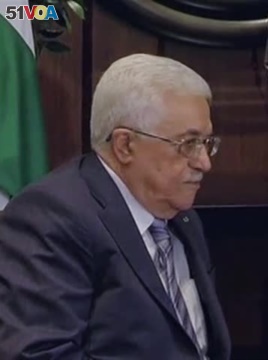August 21,2014
STATE DEPARTMENT— The Palestinian unity government of Mahmoud Abbas has failed to convince Hamas to agree to Egyptian-negotiated terms with Israel on a Gaza cease-fire. U.S. officials have worked for years on a two-state solution to the Israeli-Palestinian conflict with Abbas.

Hamas says there will be no let-up to rocket fire until Israel agrees to lift its blockade of Gaza, which is one of the sticking points in Egyptian mediation.
Meeting with Palestinian negotiators to those talks, Abbas vowed to stay with the Egyptian initiative despite Hamas' mistrust of the new government in Cairo. As it is Hamas, not Abbas, who can call off the attacks, U.S. officials say the Palestinian leader risks being overshadowed here.
"Well, we’re having a number of conversations with them, as are our other partners who have strong partnerships with the Palestinian Authority," said State Department Deputy Spokeswoman Marie Harf. "So we’re having those conversations. But at the end of the day, we need Hamas to make some decisions."
American University professor Guy Ziv says the Obama administration wants to keep Abbas "relevant" because they will need him in any lasting solution with Israel.
"It's ultimately a good idea to have a unified government because the leader of the Palestinian Authority - in this case Mahmoud Abbas - is going to have to represent all of Palestinians, not just his own faction, when a peace treaty is ultimately signed...if a peace treaty is ultimately reached," Ziv said.
A two-state solution to the long conflict that has failed, in part, because of Israel's hard line with President Abbas, says former U.S. ambassador Adam Ereli.
"In fairness to Abbas and that faction of the Palestinian body politic that is moderate and reasonable, look, the Israelis don't give them much to work with," he said.
Ereli says Abbas was weakened even before the latest fighting in Gaza.
"The Israelis, in my view, have done everything to undermine Abbas. They've reneged on prisoners. They've expanded settlements. And every time Abbas says 'well, I'm talking to the Israelis and maybe we'll get somewhere', he undermines his credibility with his own people because the Israelis make him look powerless to do anything to constrain them," he said.
The Israeli military campaign in Gaza further undercuts Abbas because it is an opening for Iran, says U.S. Institute of Peace analyst Steve Heydemann.
"It now seems as if Iran, at least, is hoping to use this crisis as a way to reinsert itself into the Palestine equation through a renewed relationship with Hamas," he said.
Abbas continues to consult with regional leaders who back the Palestinian Authority, including Jordanian King Abdullah. But U.S. officials say Hamas supporters Turkey and Qatar are less interested in the success of the Palestinian leader and the Egyptian mediation he is backing.